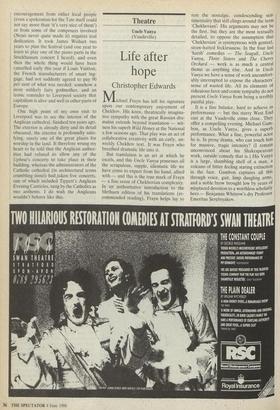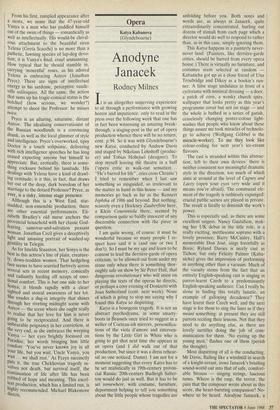Theatre
Uncle Vanya (Vaudeville)
Life after hope
Christopher Edwards
Michael Frayn has left his signature upon our contemporary enjoyment of Chekhov. His keen, theatrically imagina- tive sympathy with the great Russian dra- matist extends beyond translation — wit- ness his superb Wild Honey at the National a few seasons ago. That play was an act of collaborative creativity with an.early, un- wieldy Chekhov text. It was Frayn who breathed dramatic life into it.
But translation is an art at which he excels, and this Uncle Vanya possesses all the scrupulous, supple, idiomatic life we have come to expect from his hand, allied with — and this is the true mark of Frayn — a fine sense of Chekhovian complexity. In an authoritative introduction to the Methuen edition of his translations (re- commended reading), Frayn helps lay to rest the nostalgic, condescending sen- timentality that still dings around the term `Chekhovian'. His arguments may not be the first, but they are the most textually detailed, to oppose the assumption that `Chekhovian' is synonymous with genteel, straw-hatted fecklessness. In the four last 'harsh' comedies — The. Seagull, Uncle Vanya, Three Sisters And The Cherry Orchard — work is as much a central theme as anything else. And in Uncle Vanya we have a sense of work uncomfort- ably interrupted to expose the characters' sense of wasted life. All its elements of ridiculous farce and comic sympathy do not prevent Uncle Vanya from being a terribly painful play. It is a fine balance, hard to achieve in performance — but this starry West End cast at the Vaudeville come close. They offer a compelling evening. Michael Garn- bon, as Uncle Vanya, gives a superb performance. What a fine, powerful actor, he is. In prose 'drama, who can touch him for massive, tragic intensity? (I remain unconvinced about his Shakespearean work, outside comedy that is.) His Vanya is a large, shambling shell of a man, a volcano of bitter feeling staring extinction in the face. Oambon captures all this through voice, gait, limp dangling arms, and a noble brow brought low by years of misplaced devotion to a worthless scholarly hero — Benjamin Whitrow's dry Professor Emeritus Serebryakov.
From his first, rumpled appearance after a siesta, we sense that the 47-year-old Vanya is a man who has paddled himself out of the swim of things — romantically as well as intellectually. His would-be chival- rous attachment to the beautiful siren Yelena (Greta Scacchi) is no more than a pathetic, fawning species of lap-dog devo- tion; it is Vanya's final, cruel unmanning. How typical that he should stumble in, carrying 'mournful' roses, as his adored Yelena is embracing Astrov (Jonathan Pryce). There are signs of intellectual energy in his sardonic, perceptive vaude- ville soliloquies. All the same, the action that sums up his tragic-comical status is the botched (how serious, we wonder?) attempt to shoot the Professor: he misses twice.
Pryce is an alluring, saturnine, distant Astrov. The idealising conservationist of the Russian woodlands is a convincing drunk, as well as the local glimmer of style and intelligence. Pryce's overworked, tipsy Doctor is a touch solipsistic, delivering With rich intelligence speeches he has long ceased expecting anyone but himself to appreciate. But, erotically, there is some- thing cocksure behind his lassitude. His dealings with Yelena have a kind of drawl- ing certitude; is it this, in fact, that draws her out of the deep, dark boredom of her marriage to the dotard Professor? Pryce, as ever, is a risky, intense stage presence. Although this is a West End, star- studded, non-ensemble production, there are other essential performances. Eli- zabeth Bradley's old nurse anchors the provincial household with her 'classic God- fearing, samovar-and-salvation peasant woman. Jonathan Cecil gives a deceptively light and amusing portrait of washed-up gentility in Telegin.
As for Imelda Staunton, her Sonya is the best in this actress's line of plain, creature- 1Y, down-trodden women. That hedgehog face seems to have Scurried furtively across several sets in recent memory, comically and radiantly feeding off scraps of emo- tional comfort. This is but one side to her Sonya; it blends rapidly with a clear! Sighted and stoical awareness of her lot. She exudes a dug-in integrity that shines through her riveting midnight scene with Astrov — the scene where she ought really to realise that her love for him is never going to be reciprocated. And there is unbearable poignancy in her conviction, at the very end, as she embraces the weeping Vanya -- her eyes 'brightly focussed on Paradise, her words bringing him little Comfort: 'YOu've never known joy in all Your life, but you waft, Uncle Vanya, you Wait we shall rest.' As Frayn succinctly Puts it, the true Chekhovian tragedy in- volves not death, but• survival itself, the continuation of life after life has been robbed of hope and meaning. This excel- lent production, which has a limited run, is highly recommended. Michael Blakemore directs.



















































 Previous page
Previous page